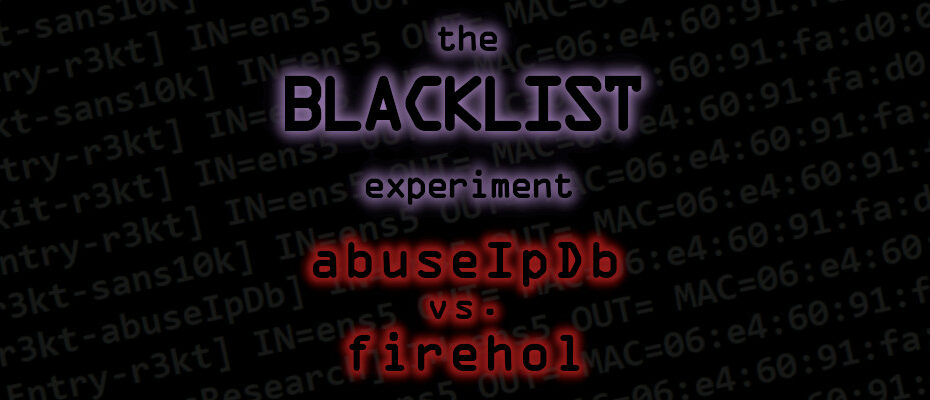The previous time I ran this experiment I compared the effectiveness of abuseIpDb‘s top 10k blacklist to blacklists provided by SANS. Combined, they were able to block 51.8% of sources trying to send unwanted traffic. AbuseIpDb was the clear winner, being able to block 41.1% of sources trying to send unwanted traffic.
In this iteration, I compared the abuseIpDb blacklist to another free blacklist, firehol.
The results
Again, I let the machine ‘listen’ for exactly 24 hours and here are the results:
The total number of undesired packets received:
# cat r3kt.log | grep "Entry" | wc -l
8121A total of 8121 undesired packets in 24 hours equate to roughly 5.6 packets per minute or one every 10.6 seconds.
The top 20 ports scanned for:
# cat r3kt.log | grep "Entry" | egrep -o 'DPT=\S*' | sort | uniq -c | sort -r | head -n 20 | cat -n
1 331 DPT=23
2 289 DPT=22
3 200 DPT=6379
4 187 DPT=5555
5 164 DPT=8088
6 122 DPT=1433
7 117 DPT=80
8 83 DPT=5060
9 81 DPT=8080
10 79 DPT=2375
11 73 DPT=443
12 64 DPT=2376
13 62 DPT=123
14 55 DPT=3389
15 54 DPT=445
16 44 DPT=53
17 32 DPT=389
18 28 DPT=10443
19 27 DPT=161
20 23 DPT=8081Telnet (23), SSH (22) and Redis (6379) once again were the top ports scanned for.
The top 20 IPS generating unwanted traffic
# cat cat r3kt.log | grep "Entry" | egrep -o 'SRC=\S*' | sort | uniq -c | sort -r | head -n 20 | cat -n
1 323 SRC=104.152.52.28
2 126 SRC=162.142.125.157
3 115 SRC=162.142.125.150
4 112 SRC=162.142.125.153
5 111 SRC=162.142.125.151
6 110 SRC=162.142.125.156
7 109 SRC=162.142.125.159
8 109 SRC=162.142.125.155
9 108 SRC=162.142.125.148
10 105 SRC=162.142.125.149
11 104 SRC=162.142.125.145
12 101 SRC=162.142.125.147
13 101 SRC=162.142.125.146
14 100 SRC=162.142.125.152
15 98 SRC=162.142.125.144
16 97 SRC=162.142.125.154
17 94 SRC=162.142.125.158
18 86 SRC=106.111.169.50
19 80 SRC=49.83.206.139
20 62 SRC=185.153.196.70Again, the scanners from the Cencys subnet generated the overwhelming majority of unwanted traffic. One IP that did a popular port scan took the #1 position.
# whois 162.142.125.0
...
NetRange: 162.142.125.0 - 162.142.125.255
...
Organization: Censys, Inc. (CENSY)
...Since it is clear that some sources generate a lot more traffic than others, it is best to look at the data from a “per source address” rather than a “per connection attempt” perspective.
The total amount of sources that sent undesired traffic:
# cat r3kt.log | egrep -o 'SRC=\S*' | sort | uniq | wc -l
2101Amount of sources not caught by the firewall:
# cat r3kt.log | grep 'Exit' | egrep -o 'SRC=\S*' | sort | uniq | wc -l
669Amount of sources caught by all the blacklists combined:
# cat r3kt.log | grep 'abuseIpDb\|firehol' | egrep -o 'SRC=\S*' | sort | uniq | wc -l
14321432 Out of a total of 2101 is an effective block rate of 68.2%, that is an improvement of 16.4% when compared to the effective block rate of 51.8% with the abuseIpDb/SANS combination.
Amount of sources caught by each blacklist individually:
# cat r3kt.log | grep 'abuseIpDb' | egrep -o 'SRC=\S*' | sort | uniq | wc -l
832
# cat r3kt.log | grep 'firehol' | egrep -o 'SRC=\S*' | sort | uniq | wc -l
1367- The abuseIpDb blacklist managed to block 39.6% of unwanted traffic, that is a decrease of 1.5% when compated to the previous round
- From all the sources detected by the abuseIpDb blacklist only 65 were not detected by the SANS blacklist.
- The clear winner in this case was the firehol blacklist that managed to block 65.1% of unwanted traffic. Well done!
